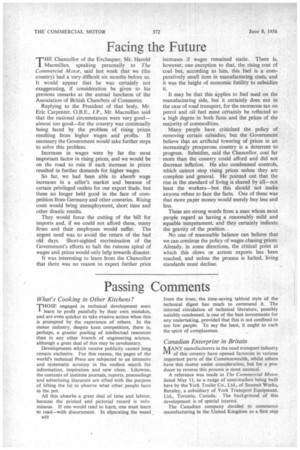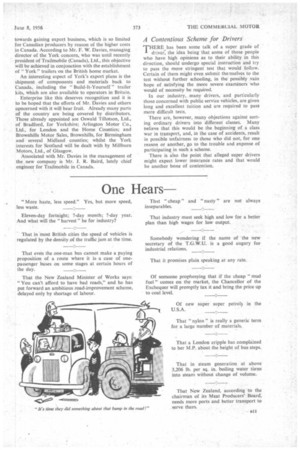Passing Comments
Page 44

Page 45

If you've noticed an error in this article please click here to report it so we can fix it.
What's Cooking in Other Kitchens?
]'HOSE engaged in technical development soon learn to profit painfully by their own mistakes, and are even quicker to take evasive action when this is prompted by the experience of others. In the motor industry, despite keen competition, there is, perhaps, a greater pooling of intellectual resources than in any other branch of engineering science, although a great deal of this may be involuntary. Developments which receive publicity cannot long remain exclusive. For this reason, the pages of the world's technical Press are subjected to an intensive and systematic scrutiny in the endless search for information, inspiration and new ideas. Likewise, the contents of institute journals, reports, proceedings and advertising literature are sifted with the purpose of lifting the lid. to observe what other people have in the pot.
All this absorbs a great deal of time and labour, because the printed and pictorial record is voluminous. If one would read to learn, one must learn to read—with discernment. In separating the wood a 1 0
from the trees, the time-saving tabloid style of the technical digest has much to commend . it. The internal circulation of technical literature, possibly suitably condensed, is one of the best investments for any undertaking, provided that this is not confined to too few people. To say the least, it ought to curb the spirit of complacence.
Canadian Enterprise in Britain
MANY manufacturers in the road transport industry of this country have opened factories in various important parts of the Commonwealth, whilst others have this matter under consideration, but for .a producer to reverse this process is most unusual.
A reference was made in The Commercial Motor dated May 11, to a range of semi-trailers being built here by the York Trailer Co., Ltd., of Summit Works, Burnley, a subsidiary of York Transport Equipment, Ltd., Toronto, Canada. The background of this development is of special interest. The Canadian company decided to commence manufacturing in the United Kingdom as a first step towards gaining export business, which is so limited for Canadian producers by reason of the higher costs in Canada. According to Mr. F. W. Davies, managing director of the York concern, who was until recently president of Trailmobile (Canada), Ltd., this objective will be achieved in conjunction with the establishment of " York " trailers on the British home market.
An interesting aspect of York's export plans is the shipment of components and materials back to Canada, including the " Build-It-Yourself" trailer kits, which are also available to operators in Britain.
Enterprise like this deserves recognition and it is to be hoped that the efforts of Mr. Davies and others concerned with it will bear fruit. Already many parts of the country are being covered by distributors. Those already appointed are Oswald Tillotson, Ltd., of Bradford, for Yorkshire; Arlington Motor Co., Ltd., for London and the Home Counties; and Brownhills Motor Sales, Brownhills, for Birmingham and several Midland counties; whilst the York interests for Scotland will be dealt with by Millburn Motors, Ltd., of Glasgow.
Associated with Mr. Davies in the management of the new company is Mr. J. R. Baird, lately chief engineer for Trailmobile in Canada.
A Contentious Scheme for Drivers
THERE has been some talk of a super grade of driver, the idea being that some of those people who have high opinions as to their ability in this direction, should undergo special instruction and try to pass the more stringent test that would follow. Certain of them might even submit themselves to the test without further schooling, in the possibly vain hope of satisfying the more severe examiners who would of necessity be required.
In our industry, many drivers, and particularly those concerned with public service vehicles, are given long and excellent tuition and are required to pass more difficult tests.
There are, however, many objections against sorting ordinary drivers into different classes. Many believe that this would be the beginning of a class war in transport, and, in the case of accidents, result in possible unfairness to those who did not, for one reason or another, go to the trouble and expense of participating in such a scheme.
There is also the point that alleged super drivers might expect lower insurance rates and that would be another bone of contention.




















































































































































